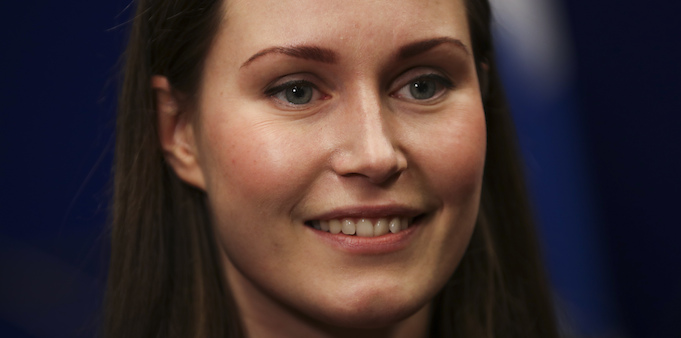
Finnish Prime Minister Sanna Marin at an EU summit at the European Council headquarters in Brussels in December 2019. Source: AP Photo/Francisco Seco
Headlines proclaiming the advent of four-day work weeks never fail to grab our attention, but there’s more to the story that’s doing the rounds about Finland’s supposed new three-day weekends.
Australian and international media outlets have this week suggested Finnish Prime Minister Sanna Marin is set to introduce four-day work weeks and six-hour work days in the Nordic country.
Marin was elected Prime Minister of Finland in December and at 34, has received her fair share of media attention as the youngest female head of government across the globe.
However, there appears to be some confusion about comments she made about flexible work practices back in August 2019, prior to becoming prime minister, and the Finnish government has taken to Twitter to clear things up.
“In the Finnish Government’s program there is no mention about 4-day week,” the government tweeted from its official account on Tuesday.
“Issue is not on the Finnish Government’s agenda.”
In the Finnish Government´s program there is no mention about 4-day week. Issue is not on the Finnish Government’s agenda. PM @marinsanna envisioned idea briefly in a panel discussion last August while she was the Minister of Transport, and there hasn’t been any recent activity.
— Finnish Government (@FinGovernment) 7 January 2020
The government said Prime Minister Sanna “envisioned [the] idea briefly in a panel discussion last August while she was the Minister of Transport, and there hasn’t been any recent activity”.
As Bloomberg explains, Marin explored the possible case for shorter working days and weeks at an anniversary event for the Social Democratic Party several months ago.
“A four-day work week, a six-hour workday, why couldn’t that be the next step? Is eight hours the final truth?” Marin reportedly said, in the context of a discussion about what a “utopian” social scenario would look like.
“I think people deserve more time with their families, hobbies, life. This could be the next step for us in working life”.
But while it’s not likely a four-day work week will become official government policy in Finland anytime soon, there are plenty of examples of local small businesses already experimenting with reducing the number of hours their staff spend at work.
Staff at Australian nail polich brand Kester Black all work a four-day week, with founder Anna Ross previously telling SmartCompany it’s important that employees have a say in any potential operational changes of this nature.
Kathryn Blackham, chief executive of Versa, told the ABC this week that adopting a four-day work week at the digital agency has led to a 30-40% increase in revenue and a trebling of profits over the past 12 months.
And over in New Zealand, Perpetual Guardian has introduced the practice after a “successful” trial. Workers at the company are able to opt-in to claim a weekly rest day and still receive their normal salaries, provided they meet “weekly productivity objectives”.
NOW READ: Can you build a great company on a four-day work week? How to do more in fewer hours


COMMENTS
SmartCompany is committed to hosting lively discussions. Help us keep the conversation useful, interesting and welcoming. We aim to publish comments quickly in the interest of promoting robust conversation, but we’re a small team and we deploy filters to protect against legal risk. Occasionally your comment may be held up while it is being reviewed, but we’re working as fast as we can to keep the conversation rolling.
The SmartCompany comment section is members-only content. Please subscribe to leave a comment.
The SmartCompany comment section is members-only content. Please login to leave a comment.